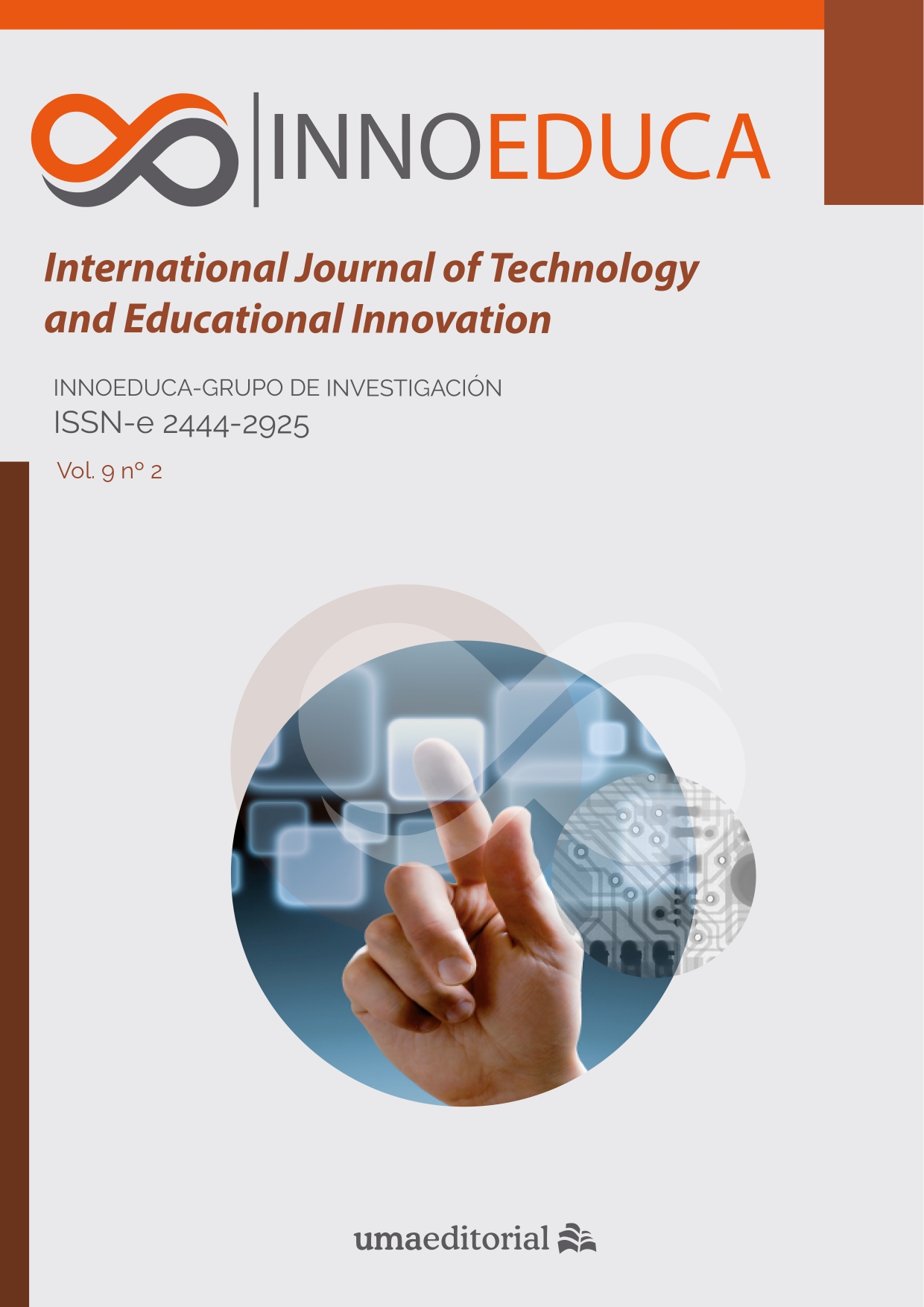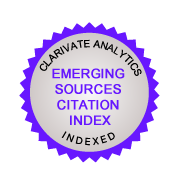Open Educational Resources (OER) in initial teacher training: technological approach in language teaching
DOI:
https://doi.org/10.24310/innoeduca.2023.v9i2.15386Keywords:
Open educational resources (OER), mother tongue instruction, initial teacher training, teacher qualifications, information technologyAbstract
This article presents a proposal for teaching open educational resources (OER) carried out in initial teacher training, based on: the knowledge and review of a selection of digital educational materials for future use and adaptation in the Language class in Secondary Education; the development of an OER design as an evaluation procedure; and, finally, the completion of a survey to assess the intervention carried out. The results obtained show that most of the students perceived OER as an innovative and recommendable proposal to improve their classroom practice, although they also revealed that it is a complex activity that needs guided accompaniment. Lack of knowledge of OER and a certain insecurity when it comes to using and adapting them to their different contexts were perceived as some of the main difficulties. On the basis of these initial results, a line of research is proposed that needs a broader context of study in order to develop new strategies in initial teacher training that allow the use of these resources in their teaching practices.
Downloads
Metrics
Publication Facts
Reviewer profiles N/A
Author statements
Indexed in
-
—
- Academic society
- N/A
- Publisher
- Universidad de Málaga
References
Baas, M., Admiraal, W., & van den Berg, E. (2019). Teachers’ Adoption of Open Educational Resources in Higher Education. Journal of Interactive Media in Education, (1), 9. https://doi.org/10.5334/jime.510
Belikov, O.M., & Bodily, R. (2016). Incentives and barriers to OER adoption: A qualitative analysis of faculty perceptions. Open Praxis, 8(3), 235-246. http://doi.org/10.5944/openpraxis.8.3.308
Bethencourt-Aguilar, A. Fernández-Esteban, M.I., González Ruiz, C.J., & Martín-Gómez, S. (2021). Recursos Educativos en Abierto (REA) en Educación Infantil: características tecnológicas, didácticas y socio-comunicativas. Innoeduca. International Journal of Technology and Educational Innovation, 7(2), 32-45. https://doi.org/10.24310/innoeduca.2021.v7i2.12273
Bosque, I. (2018). Qué debemos cambiar en la enseñanza de la gramática. ReGrOC. Revista de Gramática Orientada a las Competencias, 1(1), 11-46. https://doi.org/10.5565/rev/regroc.12
Bosque, I., & Gallego, A. (2016). La aplicación de la gramática en el aula. Recursos didácticos clásicos y modernos para la enseñanza de la gramática. RIA. Revista de Lingüística Teórica y Aplicada, 54(2), 63-85. https://dialnet.unirioja.es/servlet/articulo?codigo=6859463
Bosque, I., & Gallego, A. (2018). La gramática en la Enseñanza Media. Competencias oficiales y competencias necesarias. ReGrOC. Revista de Gramática Orientada a las Competencias, 1(1), 141-201. https://doi.org/10.5565/rev/regroc.20
Cabero, I., & Pallarés, M. (2021). Avances y retos en la implantación de las nuevas tecnologías. En I. Cabero, & M. Pallarés (Coords.), Civilización Digital y Pedagogías Emergentes a partir de las Nuevas Tecnologías (pp. 13-19). Egregius.
Cape Town Open Education Declaration. (2007). Cape Town Open Education Declaration: Unlocking the promise of open educational resources. http://www.capetowndeclaration.org/read-the-declaration
Capilla Sánchez, V. (2020). Aulas EDIA: REAdictas a la Historia durante el curso 2019-20. CEDEC. Centro Nacional de Desarrollo Curricular en sistemas no propietarios. https://cedec.intef.es/experiencia/aulas-edia-readictas-a-la-historia-durante-el-curso-2019-20/
Capilla Sánchez, V. (2021). EnREAndo en PMAR. CEDEC. Centro Nacional de Desarrollo Curricular en sistemas no propietarios. https://cedec.intef.es/experiencia/enreando-en-pmar/
Durán Rivas, C., & Rodríguez-Gonzalo, C. (2020). La enseñanza del verbo y la actividad metalingüística de los alumnos. Dos investigaciones en aulas de Secundaria. ReGrOC. Revista de Gramática Orientada a las Competencias, 3(1), 113-135. https://doi.org/10.5565/rev/regroc.24
Escámez Pastrana, A. M. (2018). Los recursos educativos abiertos (REA) y su contribución a los procesos de enseñanza y aprendizaje en la educación secundaria. II Jornadas Internacionales sobre Gestión de la Innovación Pedagógica Sostenible. Universidad de Málaga. https://cutt.ly/WhIAi9m
Gómez Carrasco, C.J., Rodríguez-Medina, J., Chaparro Sainz, Á., & Alonso García, S. (2022). Recursos digitales y enfoques de enseñanza en la formación inicial del profesorado de Historia. Educación XXI, 25(1), 143-170. https://doi.org/10.5944/educxx1.30483
López Esteban, C. (ed.) (2022). Los ODS. Avanzando hacia una educación sostenible. Ediciones Universidad de Salamanca. https://doi.org/10.14201/0AQ0327
López Gil, M. M., & Bernal Bravo, C. (2016). La cultura digital en la escuela pública. RIFOP. Revista Interuniversitaria de Formación del Profesorado, 30(1), 103-110.
Marqueta, B, López-Cortés, N., & Ariño-Bizarro, A. (eds) (2022). Avances de la Lingüística y su aplicación didáctica. Akal.
Martínez-Garrido, C. (2018). Impacto del uso de los recursos tecnológicos en el rendimiento académico. Innoeduca. International Journal of Technology and Educational Innovation, 4(2), 139-149. http://dx.doi.org/10.24310/innoeduca.2018.v4i2.4956
Mata Pardo, S., & Rubio Perea, E. M. (2022). Experiencia de formación “Uso y adaptación de REA en el ámbito lingüístico” en el CEP de Málaga. CEDEC. Centro Nacional de Desarrollo Curricular en sistemas no propietarios. https://cedec.intef.es/experiencia-de-formacion-uso-y-adaptacion-de-rea-en-el-ambito-linguistico-en-el-cep-de-malaga/
Moreno Guerrero, A.J., Miaja-Chippirraz, N., Bueno-Pedrero, A., & Borrego-Otero, L. (2020). The Information and Information Literacy Area of the Digital Teaching Competence. Revista Electrónic@ Educare, 24(3), 1-16. https://doi.org/10.15359/ree.24-3.25
Mortera, F., Salazar, A., & Rodríguez, J. (2012). Metodología de búsqueda y adopción de recursos educativos. En M. S. Ramírez, & J. V. Burgos (Coords.), Movimiento educativo abierto: acceso, colaboración y movilización de recursos educativos abiertos (pp. 65-71). Comunidad Latinoamericana Abierta Regional de Investigación Social y Educativa. https://repositorio.tec.mx/bitstream/handle/11285/577938/ebook.pdf?sequence=2&isAllowed=y
Pujolàs, P., & Lago, J. R. (s.f.). El programa CA/AC (“Cooperar para Aprender/ Aprender a Cooperar”) para enseñar a aprender en equipo. https://www.elizalde.eus/wp-content/uploads/izapideak/CA-ACprograma.pdf
Ramírez Terán, M., Celi Paredes, E., & Lligüín Lligüín, I. (2022). Recursos educativos abiertos en el proceso de enseñanza aprendizaje: revisión de la literatura. International Journal of New Education, 9, 175-187. https://doi.org/10.24310/IJNE.9.2022.14588
Recio Mayorga, J., Gutiérrez-Esteban, P., & Suárez-Guerrero, C. (2021). Recursos educativos abiertos en comunidades virtuales docentes. Apertura, 13(1), 101-117. http://dx.doi.org/10.32870/Ap.v13n1.1921
Sánchez García, J.M., & Toledo Morales, P. (2016). Aproximación al uso de Recursos Educativos Abiertos para Ciencias Sociales en Educación Secundaria y Bachillerato. Prisma Social: revista de investigación social, 15, 222-253.
Sánchez-Rivas, E., Ramos Núñez, M.F., Ramos Navas-Parejo, M., & De la Cruz-Campos, J.C. (2022). Narrative-based learning using mobile devices. Education + Training. https://doi.org/10.1108/ET-06-2022-0244
Santa María, M. T, Aliaga, L.M., & Ávaro, R. (2022). Renovarse o morir: enseñar lengua y literatura en el Siglo XXI. En A. Vico Bosch, L. Vera Caro, & O. Buzón García (coords.), Entornos virtuales para la educación en tiempos de pandemia: perspectivas metodológicas (pp. 24-43). Dykinson.
Santos-Hermosa, G., & Abadal Falgueras, E. (2022). Recursos educativos abiertos: una pieza fundamental para afrontar los actuales retos de la Educación Superior. Octaedro. https://redined.educacion.gob.es/xmlui/handle/11162/222707
Unesco (2002). Forum on the impact of open courseware for Higher Education in developing countries (final report). http://unes-doc.unesco.org/images/0012/001285/128515e.pdf
Unesco (2012). 2012 Paris Open Educational Resources (OER) declaration. http://hdl.handle.net/2445/33593
Unesco (2017). Ljubljana OER action plan 2017. https://en.unesco.org/sites/default/files/ljubljana_oer_action_plan_2017.pdf
Unesco (2019). Recommendation on open educational resources (OER). https://unesdoc.unesco.org/ark:/48223/pf0000373755/PDF/373755eng.pdf.multi.page=20
Vaillant, D., & Marcelo, C. (2021). Formación Inicial del Profesorado: Modelo Actual y Llaves para el Cambio. REICE. Revista Iberoamericana sobre Calidad, Eficacia y Cambio en Educación, 19(4), 55-69. https://doi.org/10.15366/reice2021.19.4.003
Valdera López, C., & Alberdi Causse, M. D. (2019). Proyecto EDIA. Guía de creación de REA con eXeLearning. https://descargas.intef.es/cedec/proyectoedia/guias/contenidos/guia_rea_exe/index.html
Valdera López, C., & Alberdi Causse, M. D. (2020). Primeros resultados de la investigación sobre el impacto de los REA del proyecto EDIA. https://cedec.intef.es/primeros-resultados-la-investigacion-sobre-el-impacto-de-los-rea-del-proyecto-edia/
Vásquez, M.-S., Nuñez, P., & Cuestas, J. (2023). Competencias digitales docentes en el contexto de COVID-19. Un enfoque cuantitativo. Pixel-Bit. Revista De Medios Y Educación, (67), 155–185. https://doi.org/10.12795/pixelbit.98129
Downloads
Published
How to Cite
Issue
Section
License
Copyright (c) 2023 Innoeduca. International Journal of Technology and Educational Innovation

This work is licensed under a Creative Commons Attribution-NonCommercial-NoDerivatives 4.0 International License.
All contents published by Innoeduca. International Journal of Technology and Educational Innovation are subject to Creative Commons Attribution-Nocomercial-NoDerivatives 4.0 International License, whose complete text can be consulted at https://creativecommons.org/licenses/by-nc-nd/4.0/legalcode. Thus, copying, distribution, public communication, derivative works and commercial use of content are permitted as of the aforementioned issue provided that the source and the author of the text are cited.
It is the responsibility of the authors to obtain the necessary permits for images that are subject to copyright.

This work is licensed under a Creative Commons Attribution-NonCommercial-NoDerivatives 4.0 International License.













242.png)








